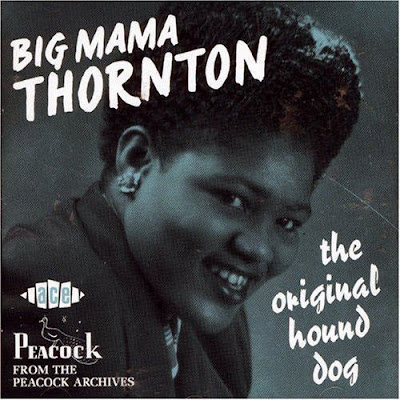Rolling Stone magazine recently released a list of "The 500 Greatest Songs of All Time": "For the first time in 17 years, we’ve completely remade our list of the best songs ever. More than 250 artists, writers, and industry figures helped us choose a brand-new list full of historic favorites, world-changing anthems, and new classics." Let's see how Alabama artists and other state connections fared on this list.
At number 350 is John Prine's "Angel from Montgomery". The song describes a woman in that city who is very unhappy with her life. Prine has said he probably used Montgomery because of its ties to Hank Williams. You can read the lyrics here. The song has been recorded by numerous artists including John Denver, Bonnie Raitt, Tonya Tucker and the Dave Matthews Band.
Raitt and Prine sing the tune in 2019
Number 318 is "Hound Dog" as recorded by Big Mama Thornton in Los Angeles on
August 13, 1952. Released in February 1953, her version sold over 500,000 copies. Of
course, Elvis recorded the song in July 1956 and that version sold over 10 million copies
worldwide and was his best-selling single. More than 250 other artists have also recorded the
tune over the years. Thornton did not write "Hound Dog", but she did write another
classic, "Ball and Chain". Thornton was born in Ariton, Alabama, on December 11, 1926
and died July 25, 1984.
Numbers 130 "Dancing in the Streets" and 257 "Heatwave" were both recorded by
Martha and the Vandellas, one of the signature Motown girl groups in the 1960's. Lead
singer Martha Reeves was born in Eufaula, Alabama, on July 18, 1941.
Rosaland Ashford, Martha Reeves, and Betty Kelley in 1965
Source: Wikipedia
Of course, Hank Williams has a couple of songs on the list, number 165 "I'm So Lonesome I Could Cry" and number 237, "You're Cheatin' Heart". Despite his brief life, Williams wrote and recorded numerous songs and has had a tremendous influence on both modern country music and popular music more broadly as well.
He's credited with helping to transform "hillbilly" music into country music and along with Woodie Guthrie was an early prototype of the singer-songwriter so prevalent from the 1960's until today.
Hank Williams and his guitar on a Montgomery street in 1938
Source: Alabama Dept of Archives and History
Wilson Pickett's "In the Midnight Hour" is number 218 on the list. The song was recorded at Stax Studios in Memphis on May 12, 1965. He and Steve Cropper--guitarist for Booker T and the MGs and numerous others--wrote the song at the Lorraine Hotel, where Martin Luther King would later be assassinated. Pickett was born March 18, 1941, in Prattville on the farm of his sharecropper parents; he had ten siblings. He died January 19, 2006; Little Richard delivered the eulogy.
Steely Dan's "Deacon Blues" appeared on the group's 1977 album Aja and is number 217 on the Rolling Stone list. You can read the lyrics here. The chorus goes
I'll learn to work the saxophone
I'll play just what I feel
Drink Scotch whisky all night long
And die behind the wheel
They got a name for the winners in the world
I want a name when I lose
They call Alabama the Crimson Tide
Call me Deacon Blues
The sentence "They call Alabama the Crimson Tide" has been explained by Donald Fagen, who along with Walter Becker made up Steely Dan. “If a college football team like the University of Alabama could have a grandiose name like the Crimson Tide, the nerds and losers should be entitled to a grandiose name as well.” That name "Deacon Blues" was suggested by the name of football player Deacon Jones.
This Alabama connection reminds me of other minor ones that have popped up from time to time in popular culture, like Groucho Mark's joke about Tuscaloosa and the reference to an Auburn football game in that great elevator scene with Frank Sinatra and Angie Dickinson in the original Ocean's 11 film.
At least one song I found was recorded at the Muscle Shoals Sound Studio. "Wild Horses" was written by guitarist Keith Richards about his wife and new son as he prepared to leave with the band for an American tour. Number 193 on the list, it was recorded December 2-4, 1969, at the Alabama studio.
I've always liked the Stones version, but I like the cover version by the British group The Sundays even better. The vocals by Harriet Wheeler really bring out the longing at the heart of the song.
Now we come to another pair of entries, both by one of the masters of classic rock and roll, Little Richard.
"Good Golly Miss Molly" is
number 92 and
"Tutti Fruitti" is
number 35. Recorded in 1956 and 1955 respectively, these two songs sent loud waves of sexual energy into popular music.
In 1957
Little Richard--real name Richard Penniman--left secular music and enrolled in Huntsville's Oakwood College to study theology. By 1962 he had returned to popular music and continued to perform and record until his death on
May 9, 2020. He is buried in Oakwood University's Memorial Gardens Cemetery.
Little Richard in 2007
Source: Wikipedia
Source: al.com
In early 1967 Franklin had left Columbia Records for Atlantic, and recorded one song in Muscle Shoals, "I Never Loved a Man (the Way I Loved You)" and it was a hit. Producer Jerry Wexler brought the Swampers as the musicians were known then to New York City, and on February 14 Franklin recorded a cover of the Otis Redding song, "Respect". Several other songs were also recorded that day, but "Respect" would become Franklin's signature tune.
Source: Discogs.com













No comments:
Post a Comment